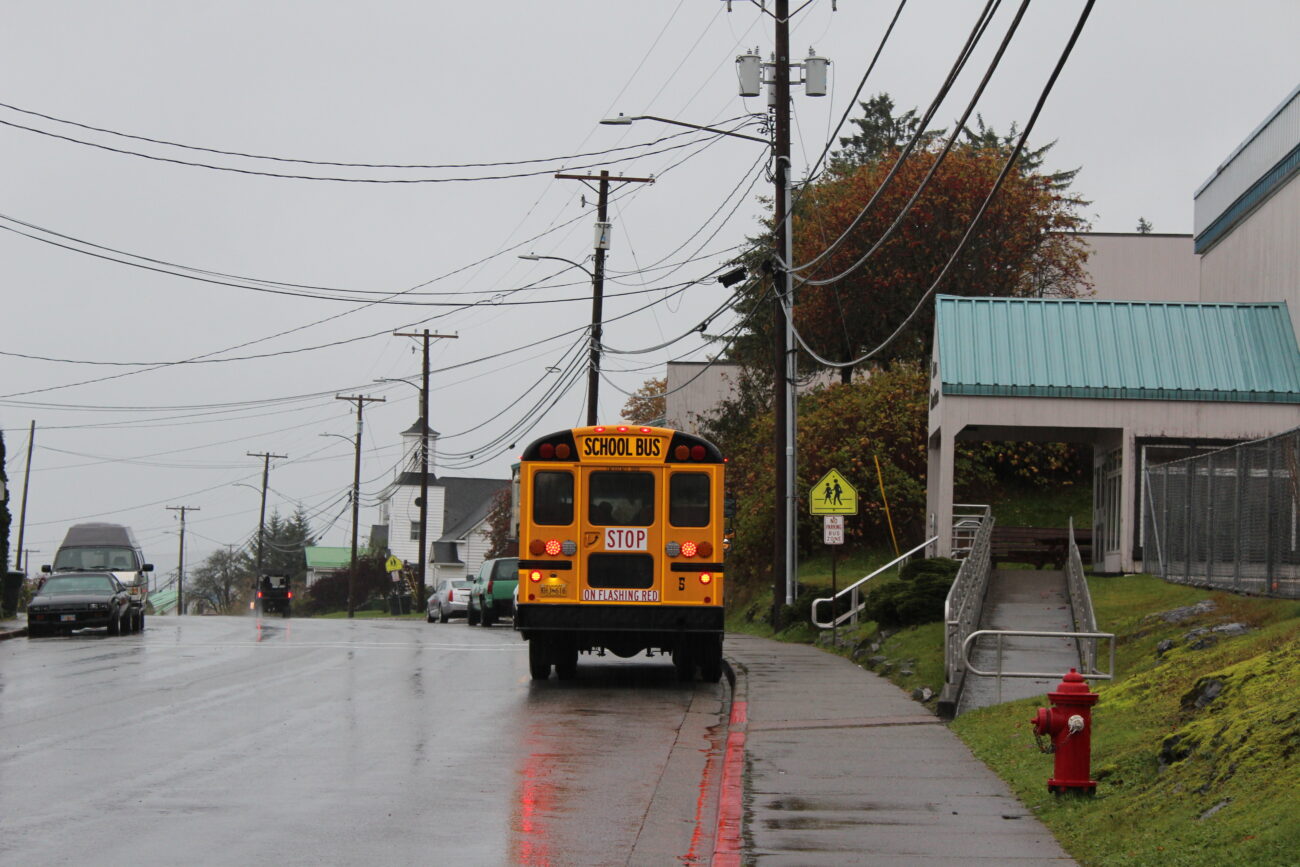
It took two special school board meetings in late summer to decide on whether Wrangell Public Schools should accept federal funds in the form of a Clean Bus Grant to obtain an electric school bus. The U.S. Environmental Protection Agency offered it to the school district in 2022 in order to decrease diesel emissions.
Approximately two years later, Wrangell’s School Board voted on Monday to decline an electric school bus through the federal grant. Board members clashed on the issue, but most thought it wasn’t good for rural Alaska.
Originally, the plan was for the bus to be up and running by October 2024, if the school district accepted the offer. But, time ticked away without any decision.
EPA was willing to work with school district on timing
Superintendent Bill Burr told the school board in late August that the EPA was willing to work with the district since the decision wasn’t yet made.
“They would like it to work so they’re finding ways that we could extend that date,” he said. “We probably have to do a month by month extension until we can actually get it.”
The bus cost $413,736.31, paid for by the grant. The school district would be responsible for the shelter the bus would be stored in and the electric drop that supplies power. Those expenses could not exceed $50,000 in the district’s reserve account.
“It’s cool, it’s green, I get it.”
Several community members opposed the bus grant at Monday’s meeting, including Zach Taylor. They had questions about building the bus’s shelter over muskeg and the costs for charging the battery. Plus, the battery would be heated by diesel throughout the nights.
“I’m a manager and driver of Taylor transportation, as well as about a 20 year background in construction,” Taylor said. “Here tonight to speak against the school board and the school purchasing the electric bus for many reasons, but mostly for the financial disaster I think it’s going to be for Wrangell and our school district.”
Taylor said that there’s hidden costs in the total price. He said he got information from international bus company, Integrated Coach Bus, and it’s likely the same thing for this bus from Blue Bird.
“International bus told us that to replace the batteries, they must be replaced in five years and that is approximately $50,000 including the $4,800 now round trip,” he said. “I also found out today the barge has a surcharge for electric vehicles added on top of that.”
He also said that to his knowledge no one in Wrangell has an endorsed Commercial Driver’s License to operate a vehicle with air brakes. That’s the braking system for electric buses.
Electric buses are significantly heavier than diesel operated buses
Additionally, he said that electric school buses are significantly heavier than diesel operated buses, meaning it could possibly sink into the muskeg over time. On top of that, he said that Taylor Transportation spent around $12,000 in fuel last year.
Taylor said, “Is the $100,000-ish that we’re about proposing on spending just to get the bus and the building, is that worth the eight and a half years of diesel fuel that we would spend by using the busses that are already in operation, doing a fine job?”
Wrangellite Mike Lockabey also voiced his opposition.
“I don’t think it’s necessary,” he said. “It’s cool, it’s green, I get it. But I haven’t seen enough, primarily in the paper from talking to federal friends involved, I haven’t seen enough research on the ancillary cost of this. You have a diesel battery heater.”
He also sees the weight of the bus being an issue.
“I look like a drunk duck when I drive home at night,” Lockabey said. “I’m going to get cited someday for being that because I’m dodging potholes on my own street, I just put a new pit and link, or a sway bar link break, and two Pippin ends in my vehicle from driving on that and I drive a Suburban. It doesn’t weigh as much as an 8000 pound battery with a bus on top of it.”
Questions about costs of shipping the bus to Wrangell and running power to the building were unanswered during the meeting.
Two motions failed
School Board President Dave Wilson attempted to amend a motion to change the $50,000 cap to $60,000. This would go for the building costs of the bus’s shelter.
“That would be the building, that would be the installation, that would be the shipping,” he said.
That also would include the electrical installation and the needed pilings to build over the muskeg.
The motion failed.
“…we have a system that works right now that’s unique within the state.”
School Board Vice President Brittany Robbins questioned why the district should even move forward with the grant.
“Something we should really consider is that we have a system that works right now that’s unique within the state – to have a company that will contract year over year, with the maintenance on their end and the gas on their end,” she said. “It’s a struggle in other places.”
Eventually, the school board voted down the 2022 EPA Clean Bus Grant, with a 2-3 vote.
John DeRuyter and David Wilson voted yes while Brittany Robbins, Elizabeth Roundtree and Angela Allen voted against the motion.











